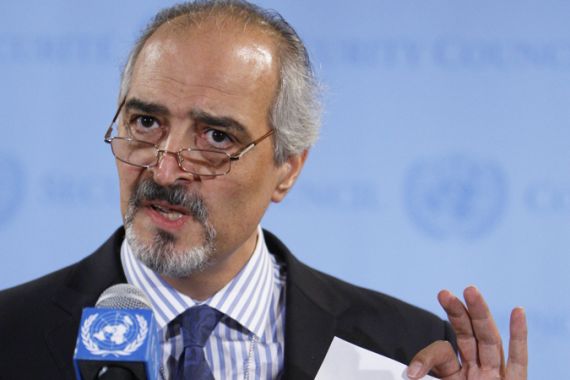Syria defiant as diplomatic pressure grows
Syrian envoy to UN slams Western ‘hypocrisy’ as US tightens sanctions and Assad admits ‘mistakes’ by security forces.

Bashar Jaafari, Syria’s ambassador to the United Nations, says the country’s sovereignty “is a red line that must not be crossed”.
“We know our commitments, our obligations but at the same time we know what are our rights. And our rights do not stem from any political pressure. They stem from our own political will,” he said after sessions at the United Nations Security Council in New York.
Jaafari, back in New York from meetings with Assad government officials in Damascus, sparked diplomatic fury by comparing the deadly unrest to the riots in Britain, adding that anti-government groups had killed 500 Syrian security forces.
He criticised Western nations for accepting the British government’s denunciation of rioters as members of gangs, while denouncing Syria for its crackdown on anti-government elements.
“They don’t allow us to use the same term for the armed groups and the terrorist groups in my country. This is hypocrisy, this is arrogance,” he said.
“They tried to manipulate the truth and to hide important facts and elements related to the so-called situation in Syria,” said Jaafari.
At least 1,700 civilians have been killed since the uprising against Assad’s rule erupted in March, rights groups say.
‘Ludicrous comparison’
Britain’s UN representative dismissed as “ludicrous” Jaafari’s comparison between the handling of the worst British riots in a generation and the killing of protesters on the streets of Syrian cities.
“In the United Kingdom, you have a situation where the government is taking measured, proportionate, legal, transparent steps to ensure the rule of law for its citizens,” he said.
|
Al Jazeera speaks to a Hama resident |
“In Syria, you have a situation where thousands of unarmed civilians are being attacked and many of them killed. That comparison made by the Syrian ambassador is ludicrous.”
Jafaari also protested western descriptions of Assad’s government as a “regime”.
“I would not describe the government of Britain as regime, I would not describe the chancellor of Germany as regime, I would not say the government of (French President Nicolas) Sarkozy is a regime,” he said.
“Our president is democratically elected, equal to Sarkozy, (US President Barack) Obama and the German Chancellor (Angela Merkel).”
‘Mistakes made’
The ambassador’s comments came after President Bashar al-Assad admitted that “some mistakes” had been made by security forces, in a meeting with a delegation from UN Security Council members Brazil, India and South Africa.
Envoys from the three countries met in Damascus on Wednesday and held talks with the president and his foreign minister, Walid al-Muallem.
Assad reassured the delegation that reforms were coming; that elections would be held before the year’s end and that the constitution was open to amendment if needed.
The United States called for greater international pressure on Assad ahead of the Security Council session in New York.
 |
But Susan Rice, the US ambassador to the UN, expressed doubt that the Security Council would agree on a resolution threatening sanctions against Assad for his crackdown on opposition protests.
“From the United States’ point of view we are going to continue and intensify our pressure both through our national actions, in additional sanctions, as well as co-ordinated efforts with other partners here in New York and around the world,” Rice told reporters.
US sanctions
The US Department of Treasury issued sanctions on the commercial bank of Syria, and its Lebanon-based subsidiary, as well as Syriatel, the largest mobile phone operator.
“The kingdom of Morocco, which has traditionally refrained from interfering in the internal affairs of other countries, expresses today its strong worries and deep concern over the sad events rocking Syria,” the foreign ministry said in a statement late on Wednesday.
European members of the Security Council also threatened Syria with tougher UN action, while Russia urged Damascus to implement promised reforms as soon as possible.
Morocco became the latest nation to express concern, calling for an “inclusive” dialogue to end the crisis.
But diplomatic efforts appear to have done little to stall the fighting on the ground.
Tanks storm towns
Syrian tanks stormed two northwestern towns near the border with Turkey, local residents said, a day after Ankara pressed Damascus to end killings of civilians.
The Syrian Observatory for Human Rights (SOHR) said at least one woman was killed and 13 people injured on Wednesday when 12 tanks and armoured vehicles, entered the towns of Taftanaz and Sermin, around 30km from the border with Turkey.
In Homs at least 16 people have been killed by security forces, activists said.
Omer Onhon, the Turkish ambassador, visited Hama on Wednesday and said that tanks were moving out of the city 10 days after the army stormed in.
Forty personnel carriers decked with Syrian flags rolled out of Hama with soldiers chanting slogans praising embattled Assad, said a journalist from the AFP news agency who visited the city on a tour organised by the authorities.
However, witnesses told Al Jazeera that Syrian army forces moved back into the town after Onhon’s visit.
Syrian troops also seized control of the eastern flashpoint city of Deir ez-Zor on Wednesday following intense shelling and gunfire, an activist said. The city has been under attack by Assad’s forces for four days.
In the town of Albukamal, located in the province of Deir ez-Zor, the security forces and members of the Shabiha armed group carried out a campaign of mass arrests early Wednesday morning, detaining at least 35 people, Avaaz, an international human rights organisation, said.
Syrian troops also launched another operation in three suburbs of the capital Damascus, the London-based SOHR said.